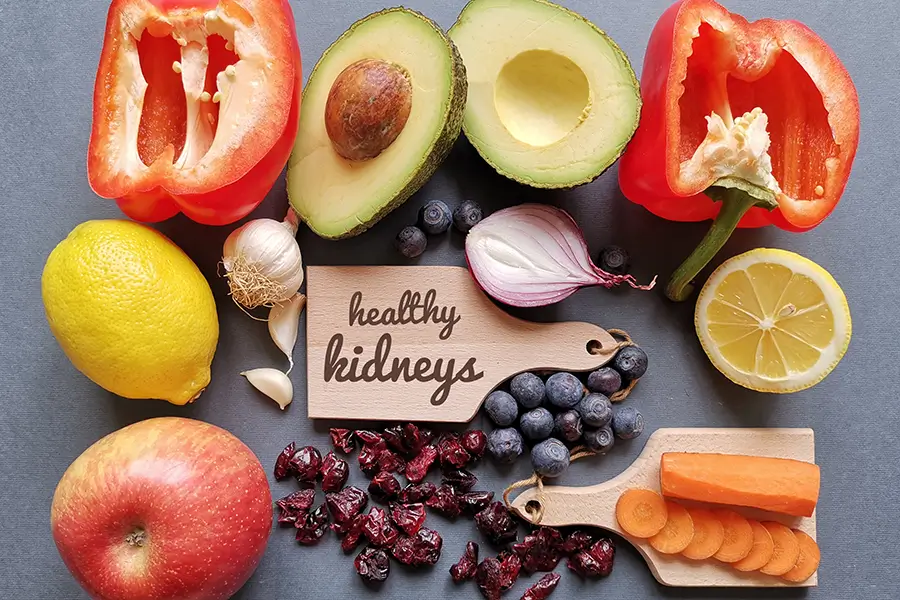Top 10 Kidney-Friendly Foods
Home > Top 10 Kidney-Friendly Foods
Maintaining kidney health is crucial for overall well-being. The kidneys play a vital role in filtering waste products from the blood, balancing fluids, and regulating essential minerals. Diet significantly impacts kidney function, and including kidney-friendly foods can help support these vital organs. In this article, we’ll explore the top 10 kidney-friendly foods to include in your diet.

Talk to Your Doctor
Before making any significant dietary changes, it’s essential to consult with your healthcare provider. Each person’s health needs are unique, and your doctor can provide personalized advice based on your specific condition. Working with a registered dietitian is also beneficial. A dietitian can help create a customized meal plan that meets your nutritional needs while supporting kidney health.
Understanding Kidney-Friendly Foods
Kidney-friendly foods are those that are low in sodium, potassium, and phosphorus, which are minerals that can accumulate in the blood when the kidneys are not functioning properly. Consuming foods with these characteristics helps reduce the strain on the kidneys and supports their function. Let’s dive into the top 10 kidney-friendly foods you could consider adding to your diet with the guidance of professionals.
The Top 10 Kidney-Friendly Foods
- Red Bell Peppers Red bell peppers are low in potassium and high in vitamins A, C, and B6, as well as folic acid and fiber. They contain powerful antioxidants like lycopene, which helps protect against certain types of cancer. Adding red bell peppers to your diet is simple. You can enjoy them raw in salads, roasted as a side dish, or blended into a delicious red pepper hummus.
- Cabbage Cabbage is a cruciferous vegetable that’s packed with vitamins K, C, and B6, as well as fiber and folic acid. It’s low in potassium, making it an excellent choice for kidney-friendly diets. Cabbage can be used in a variety of dishes, from coleslaw to stir-fries. You can also use it as a wrap instead of bread for a low-carb alternative.
- Cauliflower Cauliflower is another kidney-friendly vegetable that’s rich in vitamin C, folate, and fiber. It’s a versatile food that can be mashed, steamed, roasted, or used as a low-carb substitute for rice or potatoes. Cauliflower contains compounds that help the liver neutralize toxic substances, which supports overall detoxification.
- Garlic Garlic is known for its numerous health benefits, including its ability to enhance immune function. It’s low in potassium and phosphorus, making it a great addition to a kidney-friendly diet. Garlic can be used to flavor a variety of dishes, from soups and stews to roasted vegetables and meats. Its antioxidant properties also help reduce inflammation.
- Onions Onions are low in potassium and packed with antioxidants, particularly quercetin, which helps reduce heart disease and protects against many types of cancer. They add flavor to foods without adding sodium, which is crucial for those with kidney concerns. Onions can be sautéed, caramelized, or used raw in salads and sandwiches.
- Apples Apples are not only low in potassium and phosphorus but also high in fiber and anti-inflammatory compounds. They help reduce cholesterol, prevent constipation, and protect against heart disease and cancer. Apples make an excellent snack, can be added to salads, or baked for a healthy dessert option.
- Cranberries Cranberries are beneficial for urinary tract health, which is closely related to kidney health. They are low in potassium and rich in antioxidants. Cranberries can be enjoyed as a juice, dried for snacks, or added to salads and oatmeal. Their tart flavor pairs well with both sweet and savory dishes.
- Blueberries Blueberries are high in antioxidants and low in potassium, making them a perfect addition to a kidney-friendly diet. They help reduce inflammation and protect against heart disease and diabetes. Blueberries can be eaten fresh, added to cereals and smoothies, or baked into healthy desserts.
- Raspberries Raspberries are another berry that’s great for kidney health. They are high in fiber, vitamin C, and antioxidants, while being low in potassium and phosphorus. Raspberries can be enjoyed fresh, in smoothies, or as a topping for yogurt and cereals.
- Strawberries Strawberries are rich in antioxidants, vitamin C, manganese, and fiber. They help protect the heart, reduce inflammation, and promote overall kidney health due to their low potassium content. Strawberries are delicious on their own, in fruit salads, or blended into smoothies.
Tips for Creating a Kidney-Friendly Meal Plan
Creating a kidney-friendly meal plan involves balancing these nutritious foods with your dietary needs. Here are some tips to help you get started:
- Plan Ahead: Prepare a weekly meal plan that includes a variety of kidney-friendly foods.
- Portion Control: Pay attention to portion sizes to avoid consuming too much potassium or phosphorus.
- Stay Hydrated: Drink plenty of water to help your kidneys filter waste.
- Limit Processed Foods: Avoid processed foods high in sodium, which can strain the kidneys.
- Consult a Dietitian: Work with a registered dietitian to create a meal plan tailored to your needs.
Sample Meal Plan
Here’s a sample meal plan that incorporates the top 10 kidney-friendly foods:
Breakfast:
- Oatmeal topped with fresh blueberries and a drizzle of honey.
Lunch:
- Grilled chicken salad with red bell peppers, onions, and a lemon vinaigrette dressing.
Snack:
- Sliced apple with a handful of cranberries.
Dinner:
- Roasted cauliflower and garlic with a side of steamed cabbage.
Dessert:
- Strawberry and raspberry fruit salad.
Maintaining a kidney-friendly diet is essential for supporting kidney function and overall health. By including these top 10 foods in your diet, you can help protect your kidneys and promote better health. Remember, it’s crucial to consult with your healthcare provider and work with a dietitian to ensure your diet meets your specific needs.
Pass it along
For more tips on kidney health and personalized dietary advice, subscribe to our blog. Share this post with friends and family who might benefit from this information. Explore more resources on our website to learn about maintaining kidney health and managing kidney-related conditions.
By making informed dietary choices, you can take proactive steps toward better kidney health and overall well-being.
Contact us now for more info.
